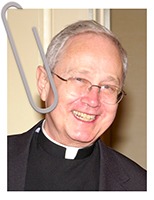“Pay it Forward” and Divine Mercy
Many may remember a movie in 2000 called “Pay It Forward.” The lead line in the movie was, “When someone does you a good deed, don’t pay it back, pay it forward.”
In Ryan Hyde’s movie it is described as an obligation to do three good deeds for others in response to a good deed that one receives. Such good deeds should accomplish things that the other person cannot accomplish on their own. In this way, the practice of helping one another can spread geometrically through society, at a ratio of three to one, creating a social movement with an impact of making the world a better place.
It is not a new idea. Benjamin Franklin described the idea in a letter dated 1784. In the late 19th century Florence Nightingale said, “If I could give you information of my life it would be to show how a woman of very ordinary ability has been led by God in strange and unaccustomed paths to do in His service what He has done in her.”
On 2 November 1656, St. Vincent de Paul invited his Missioners to exercise mercy always: at home, in the countryside, on missions, always hastening to help others.
Of course, it goes back even further. Jesus said to us: “Be merciful, as your Father is merciful” (Luke 6:36). Sounds a lot like “Pay it forward.” Actually, it is the only thing we can do! We can never pay God back. “God has first loved us.” Wasn’t that the whole point of Parable of the Unforgiving Servant (Matthew 18:21-35)?
Divine mercy in the eye of Pope Francis… and Jesus
Listen to what Pope Francis has said…
- Mercy is not a dimension among others, but it is the center of Christian life: there is no Christianity without mercy. John Paul II said that. If all our Christianity does not lead us to mercy, we have gone the wrong way, because mercy is the only true goal of every spiritual journey. It is one of the most beautiful fruits of love. CCC, 1829).
- “The hand that always puts us back on our feet is mercy: God knows that without mercy we will remain on the ground, that in order to keep walking, we need to be put back on our feet,
- Jesus tells us that mercy towards a human life in need is the true face of love. That’s how you become true disciples of Jesus and reveals the face of the Father’s: “be merciful, as your Father is merciful” (Lk 6.36)
- “Do not judge others; do not condemn; forgive: in this way you imitate the mercy of the Father. In order not to not go astray in life, we need to imitate God; walk in the sight of the Father.
- “I felt so strong that this is the message I must give, as Bishop of Rome: mercy, mercy, please, forgiveness.”
- “Today I ask you in the name of Christ and the Church, never tire of being merciful.”
Let’s not forget the title of his first book as Pope… “The Name of God is Mercy”!
Divine Mercy Sunday
Divine Mercy Sunday is a reminder to not only ask for and express gratitude for… but also “pay it forward”. Encouraging those we help to pay it forward can indeed multiply the good we practice. This sounds a lot like something we miss when we celebrate. God shows us mercy and expect us to show mercy. It also sounds a lot like deep “evangelization.”
Of course the catch is… If you don’t know how much mercy God has shown to you, you can not understand what paying mercy forward means.
Sr. Regina Bechtle, SC encourages us to celebrate when we have known the touch of mercy.
- Thomas knew it when Jesus took his hand and firmly guided it to probe those wounds that Thomas remembered so well.
- The sick and those with troubled spirits who gathered in Solomon’s portico knew it when the touch of the apostle’s shadow brought them healing.
- We know it by the lump in our throats when we hear of Gabrielle Giffords, Steven McDonald, Immaculée Ilibagiza, the Amish community of Nickel Mines, PA, Malala Yousafzai, Colleen Kelly and the September 11 Families for Peaceful Tomorrows – people who turn anger and grief at injustice into action for reconciliation and peace-building. They teach us that mercy has muscles.
Getting Practical with Sr. of Charity Regina Bechtle…
When have you touched others with mercy? Perhaps you have
- reached out to someone who, years ago, spoke hurtful words to you.
- made time to call or visit the relative who tells you the same stories over and over.
- bit your tongue and swallowed a sarcastic answer or a rough retort.
- rolled away the stone of a past hurt and reached out with a hug, a smile, a handshake of forgiveness.

Good afternoon Fr.,
I’m sorry for being off topic but I came across your blog while researching Msgr. Francis J. Oechsler. He created an alcove in St. Andrew Avellino Church dedicated to the Sacred Heart of Jesus. All the surrounding Saints were selected for a reason. I’m trying to piece together his vision but I can’t find anything written about it however the alcove continues to inspire worshipers to this day.
Any information or inspiration you can provide would be greatly appreciated.
Have a blessed day. Dan
Unfortunately, I am not familiar with the shrine you mention. Am I correct in assuming that Vincent is one of the saints in this alcove?
If that is case, would you tell me more about what you mean by trying to piece together his vision?
Do you refer to Monsignor’s vision of the alcove or perhaps, if Vincent is among the saints in the alcove, why Monsignor might have chosen him,